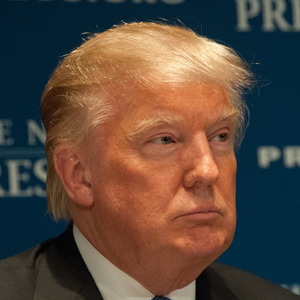Would SCOTUS uphold Trump's plan to bar Muslim immigrants?

Image of Donald Trump from Albert H. Teich / Shutterstock.com.
Donald Trump’s plan to ban Muslim immigrants would violate international law, but the U.S. Supreme Court would likely uphold it anyway, according to several legal experts. Others, however, believed the court could rely on the First and Fifth amendments to strike it down.
Donald Trump’s plan—as clarified by him on Tuesday—would ban foreign Muslims from entering the United States, but not Muslim U.S. citizens who want to re-enter the country after foreign travel, the New York Times reports. That clarification may eliminate constitutional objections, several experts told the newspaper.
Trump’s plan violates a treaty ratified by the United States, the International Covenant on Civil and Political Rights, the Times explains. It bars discrimination on the basis of religion against all persons, not just citizens. But Congress has not made the treaty enforceable in U.S. courts, so it is unlikely that the Supreme Court would invalidate a Muslim immigrant ban on that basis, experts told the Times.
Several experts also thought the U.S. Supreme Court would uphold the ban because of courts’ deferential approach in the area of immigration law, according to the Times, the Wall Street Journal Law Blog, and a New York Times op-ed by Temple University law professor Peter Spiro.
Others—including Harvard law professor Laurence Tribe—believe the plan is unconstitutional, according to those publications and NBC News.
Under the U.S. Supreme Court’s plenary power doctrine, courts show great deference to Congress when it enacts immigration laws. And the Immigration and Nationality Act passed by Congress already authorizes the president to suspend the entry of any class of aliens deemed detrimental to the interest of the United States, Spiro writes in his op-ed.
The plenary power doctrine dates back to an 1889 Supreme Court decision that upheld Congress’ exclusion of Chinese laborers from the United States. “Unlike other bygone constitutional curiosities that offend our contemporary sensibilities,” Spiro writes, “the Chinese Exclusion case has never been overturned.”
Some legal scholars, however, say Supreme Court cases upholding congressional immigration power are discredited and the court would likely strike down Trump’s ban. Stanford law professor Jenny Martinez saw an equal protection violation, while Harvard law professor Laurence Tribe saw violation of the First Amendment’s religion clauses, the due-process clause, and the Constitution’s ban on religious tests outside of the immigration context, NBC News reports.
“If Trump argues that the First and Fifth Amendments apply only to U.S. citizens, and not to foreigners, then he is just wrong about American law,” Tribe told MSNBC in a Q-and-A.
“It is true,” Tribe continued, “there are some court decisions ruling that a few parts of the Constitution do not apply to people who are not U.S. citizens and who are abroad, such as protections against unreasonable searches that would otherwise be illegal if conducted on Americans in the U.S. But those precedents have nothing to do with the Constitution’s limits on government in this area—there is no such limit on the First Amendment’s bar against declaring an official religion, or such a limit on the Fifth Amendment’s protection of due process. Under Supreme Court precedent, that protection applies to U.S. conduct impacting any ‘person’—American citizen or not, wherever located.”



